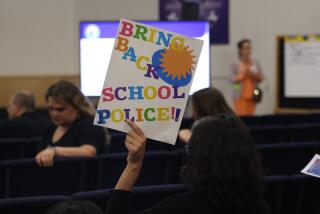Op-Ed: The Ferguson effect in Los Angeles – more crime
Crime rose dramatically in Los Angeles last year, according to Los Angeles Police Department data. Homicides were up 10%, shooting victims up 12.6%, and aggravated assaults up 27.5%, compared with 2014. Violent crime overall was up nearly 20%. Property crime increased more than 10%.
Los Angeles’ crime victims are not alone, however. The city’s crime increase is part of a nationwide trend. Homicides are up about 16% in the 60 largest U.S. cities, compared with 2014. Baltimore’s per capita killing rate is now the highest in its history. Shootings in Cincinnati were up 30% by mid-September 2015 compared with the same period in 2014. Homicides in St. Louis were up 60% by the end of August. Shootings in Chicago were up 17% and homicides up 15%. Sacramento had the bloodiest 12 months last year since 2008.
The likeliest reason for the crime surge is what I and others call the Ferguson effect: Officers are backing off proactive policing, and criminals are emboldened.
This national crime increase is a reversal from the first half of 2014, when violent crime dropped nearly 5% across the country. Shootings and homicides nationwide began rising in the second half of the year, leaving 2014’s violent crime tally a wash. The increase continued through 2015. In response, Atty Gen. Loretta Lynch convened an emergency meeting of 100 police chiefs, mayors and federal prosecutors in October 2015 to strategize about the growing violence.
The likeliest reason for the crime surge is what I and others call the Ferguson effect: Officers are backing off proactive policing, and criminals are emboldened. Since the police killing of Michael Brown in Ferguson, Mo., in August 2014, the Black Lives Matter protest movement has routinely labeled cops murderers and bigots. Activists and politicians denounce pedestrian stops and public-order enforcement as racist. Arrests in urban neighborhoods have become dangerously fraught, with bystanders cursing at officers, throwing things at them, and sometimes interfering with their lawful authority. Cops worry that if they have to use force against a resisting suspect, an incomplete cellphone video that fails to convey the suspect’s resistance will put their careers in jeopardy.
Official spokesmen deny that policing practices have changed, but there is evidence that cops are responding to this political and street pressure by doing less of the discretionary policing that has come under such fire. An officer who works on Los Angeles’ Westside told me recently: “The topic of Ferguson has been heavily discussed [among cops]. It’s had a chilling effect in terms of how line officers perceive their work and how aggressively they approach it. Veteran officers say they now let a lot of things slide that they would not have in the past.” An officer from South Los Angeles reported: “Gang members are emboldened by what is happening. They’re constantly … putting phones in our faces, and yelling racial epithets. At some point, especially at night, that phone will be a gun.” L.A. officers are advising one another that it’s crazy to get out of their cars, unless it’s a 911 call, another cop said.
Arrests in Los Angeles were down more than 9% in 2015 compared with 2014, and down 17% compared with 2013. Arrests decreased further in police divisions where tensions run particularly high. In the Newton Division, arrests are down 13% compared with 2014 and down nearly 28% compared with 2013. Newton was where Ezell Ford was killed by Los Angeles Police Department officers in August 2014 after Ford tried to grab an officer’s gun. Homicides in Newton rose 80% in 2015, violent crime was up 25%, and shooting victims, up 31%.
FBI Director James Comey has seconded the Ferguson effect, influenced by conversations with police chiefs and officers across the country. Officers in one big-city precinct described being surrounded and taunted “the moment they get out of their cars,” Comey said in a speech in October. “They told me, ‘We feel like we’re under siege.’” Comey concluded: The “chill wind blowing through American law enforcement … is surely changing behavior.”
California’s Proposition 47 is probably contributing as well to the state’s crime increase. That ballot measure, which went into effect in 2015, downgraded many property and drug felonies to misdemeanors. Criminals are doing a fraction of the time they once were, if they are being arrested at all.
But reaction to anti-cop vitriol is the biggest driver of the crime increase in Los Angeles and nationally. None of the factors usually blamed for crime — poverty, income inequality, the availability of illegal guns — have significantly worsened over the last year and a half. The one thing that has changed is the relentless, virulent discourse about the police.
“Clearly there’s a war on the police,” a cop who works in Los Angeles’ most gang-infested areas told me. “Physically, it’s perpetrated by gang members. But there’s also a political war. We can’t win that war; citizens will have to.”
Police departments must relentlessly reinforce an officer’s obligation to treat everyone with courtesy and respect. They must also drill incessantly on tactics to de-escalate confrontations. Every police killing of an innocent, unarmed civilian is a stomach-churning tragedy. But the number of such police victims is a minute fraction of the people, the majority black, killed by criminals each year. Contrary to the claims of the Black Lives Matter movement, the police are the one government agency most dedicated to the proposition that black lives matter. When the police back off, it’s inner-city residents who suffer the most. Unless the discourse around policing changes, more black lives will be lost to gun violence.
Heather Mac Donald is the Thomas W. Smith fellow at the Manhattan Institute and the author of “Are Cops Racist?”
Follow the Opinion section on Twitter @latimesopinion and Facebook
More to Read
A cure for the common opinion
Get thought-provoking perspectives with our weekly newsletter.
You may occasionally receive promotional content from the Los Angeles Times.










